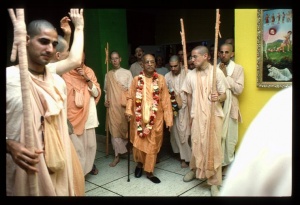SB 8.15.10-11: Difference between revisions
m (1 revision(s)) |
(Vanibot #0054 edit - transform synonyms into clickable links, which search similar occurrences) |
||
| (One intermediate revision by one other user not shown) | |||
| Line 1: | Line 1: | ||
{{info | {{info | ||
|speaker= | |speaker=Śukadeva Gosvāmī | ||
|listener=King | |listener=King Parīkṣit | ||
}} | }} | ||
[[Category:Srimad-Bhagavatam - Canto 08 Chapter 15]] | |||
[[Category:Bhagavatam Verses Spoken by Sukadeva Gosvami - Vanisource|081510]] | |||
<div style="float:left">'''[[Srimad-Bhagavatam]] - [[SB 8|Eighth Canto]] - [[SB 8.15: Bali Maharaja Conquers the Heavenly Planets|Chapter 15: Bali Mahārāja Conquers the Heavenly Planets]]'''</div> | |||
<div style="float:right">[[File:Go-previous.png|link=SB 8.15.8-9]] '''[[SB 8.15.8-9]] - [[SB 8.15.12]]''' [[File:Go-next.png|link=SB 8.15.12]]</div> | |||
{{RandomImage}} | |||
==== TEXTS 10-11 ==== | ==== TEXTS 10-11 ==== | ||
<div | <div class="verse"> | ||
tulyaiśvarya-bala-śrībhiḥ | :tulyaiśvarya-bala-śrībhiḥ | ||
sva-yūthair daitya-yūthapaiḥ | :sva-yūthair daitya-yūthapaiḥ | ||
pibadbhir iva khaṁ dṛgbhir | :pibadbhir iva khaṁ dṛgbhir | ||
dahadbhiḥ paridhīn iva | :dahadbhiḥ paridhīn iva | ||
vṛto vikarṣan mahatīm | |||
āsurīṁ dhvajinīṁ vibhuḥ | :vṛto vikarṣan mahatīm | ||
yayāv indra-purīṁ svṛddhāṁ | :āsurīṁ dhvajinīṁ vibhuḥ | ||
kampayann iva rodasī | :yayāv indra-purīṁ svṛddhāṁ | ||
:kampayann iva rodasī | |||
</div> | </div> | ||
| Line 21: | Line 27: | ||
==== SYNONYMS ==== | ==== SYNONYMS ==== | ||
<div | <div class="synonyms"> | ||
tulya- | ''[//vanipedia.org/wiki/Special:VaniSearch?s=tulya&tab=syno_o&ds=1 tulya]-[//vanipedia.org/wiki/Special:VaniSearch?s=aiśvarya&tab=syno_o&ds=1 aiśvarya]'' — equal in opulence; ''[//vanipedia.org/wiki/Special:VaniSearch?s=bala&tab=syno_o&ds=1 bala]'' — strength; ''[//vanipedia.org/wiki/Special:VaniSearch?s=śrībhiḥ&tab=syno_o&ds=1 śrībhiḥ]'' — and in beauty; ''[//vanipedia.org/wiki/Special:VaniSearch?s=sva&tab=syno_o&ds=1 sva]-[//vanipedia.org/wiki/Special:VaniSearch?s=yūthaiḥ&tab=syno_o&ds=1 yūthaiḥ]'' — by his own men; ''[//vanipedia.org/wiki/Special:VaniSearch?s=daitya&tab=syno_o&ds=1 daitya]-[//vanipedia.org/wiki/Special:VaniSearch?s=yūtha&tab=syno_o&ds=1 yūtha]-[//vanipedia.org/wiki/Special:VaniSearch?s=paiḥ&tab=syno_o&ds=1 paiḥ]'' — and by the chiefs of the demons; ''[//vanipedia.org/wiki/Special:VaniSearch?s=pibadbhiḥ&tab=syno_o&ds=1 pibadbhiḥ]'' — drinking; ''[//vanipedia.org/wiki/Special:VaniSearch?s=iva&tab=syno_o&ds=1 iva]'' — as if; ''[//vanipedia.org/wiki/Special:VaniSearch?s=kham&tab=syno_o&ds=1 kham]'' — the sky; ''[//vanipedia.org/wiki/Special:VaniSearch?s=dṛgbhiḥ&tab=syno_o&ds=1 dṛgbhiḥ]'' — with the sight; ''[//vanipedia.org/wiki/Special:VaniSearch?s=dahadbhiḥ&tab=syno_o&ds=1 dahadbhiḥ]'' — burning; ''[//vanipedia.org/wiki/Special:VaniSearch?s=paridhīn&tab=syno_o&ds=1 paridhīn]'' — all directions; ''[//vanipedia.org/wiki/Special:VaniSearch?s=iva&tab=syno_o&ds=1 iva]'' — as if; ''[//vanipedia.org/wiki/Special:VaniSearch?s=vṛtaḥ&tab=syno_o&ds=1 vṛtaḥ]'' — surrounded; ''[//vanipedia.org/wiki/Special:VaniSearch?s=vikarṣan&tab=syno_o&ds=1 vikarṣan]'' — attracting; ''[//vanipedia.org/wiki/Special:VaniSearch?s=mahatīm&tab=syno_o&ds=1 mahatīm]'' — very great; ''[//vanipedia.org/wiki/Special:VaniSearch?s=āsurīm&tab=syno_o&ds=1 āsurīm]'' — demoniac; ''[//vanipedia.org/wiki/Special:VaniSearch?s=dhvajinīm&tab=syno_o&ds=1 dhvajinīm]'' — soldiers; ''[//vanipedia.org/wiki/Special:VaniSearch?s=vibhuḥ&tab=syno_o&ds=1 vibhuḥ]'' — most powerful; ''[//vanipedia.org/wiki/Special:VaniSearch?s=yayau&tab=syno_o&ds=1 yayau]'' — went; ''[//vanipedia.org/wiki/Special:VaniSearch?s=indra&tab=syno_o&ds=1 indra]-[//vanipedia.org/wiki/Special:VaniSearch?s=purīm&tab=syno_o&ds=1 purīm]'' — to the capital of King Indra; ''[//vanipedia.org/wiki/Special:VaniSearch?s=su&tab=syno_o&ds=1 su]-[//vanipedia.org/wiki/Special:VaniSearch?s=ṛddhām&tab=syno_o&ds=1 ṛddhām]'' — very opulent; ''[//vanipedia.org/wiki/Special:VaniSearch?s=kampayan&tab=syno_o&ds=1 kampayan]'' — causing to tremble; ''[//vanipedia.org/wiki/Special:VaniSearch?s=iva&tab=syno_o&ds=1 iva]'' — as if; ''[//vanipedia.org/wiki/Special:VaniSearch?s=rodasī&tab=syno_o&ds=1 rodasī]'' — the complete surface of the world. | ||
</div> | </div> | ||
| Line 28: | Line 34: | ||
==== TRANSLATION ==== | ==== TRANSLATION ==== | ||
<div | <div class="translation"> | ||
When he assembled with his own soldiers and the demon chiefs, who were equal to him in strength, opulence and beauty, they appeared as if they would swallow the sky and burn all directions with their vision. After thus gathering the demoniac soldiers, Bali Mahārāja departed for the opulent capital of Indra. Indeed, he seemed to make the entire surface of the world tremble. | When he assembled with his own soldiers and the demon chiefs, who were equal to him in strength, opulence and beauty, they appeared as if they would swallow the sky and burn all directions with their vision. After thus gathering the demoniac soldiers, Bali Mahārāja departed for the opulent capital of Indra. Indeed, he seemed to make the entire surface of the world tremble. | ||
</div> | </div> | ||
__NOTOC__ | |||
<div style="float:right; clear:both;">[[File:Go-previous.png|link=SB 8.15.8-9]] '''[[SB 8.15.8-9]] - [[SB 8.15.12]]''' [[File:Go-next.png|link=SB 8.15.12]]</div> | |||
__NOTOC__ | |||
__NOEDITSECTION__ | |||
Latest revision as of 23:17, 18 February 2024

A.C. Bhaktivedanta Swami Prabhupada
TEXTS 10-11
- tulyaiśvarya-bala-śrībhiḥ
- sva-yūthair daitya-yūthapaiḥ
- pibadbhir iva khaṁ dṛgbhir
- dahadbhiḥ paridhīn iva
- vṛto vikarṣan mahatīm
- āsurīṁ dhvajinīṁ vibhuḥ
- yayāv indra-purīṁ svṛddhāṁ
- kampayann iva rodasī
SYNONYMS
tulya-aiśvarya — equal in opulence; bala — strength; śrībhiḥ — and in beauty; sva-yūthaiḥ — by his own men; daitya-yūtha-paiḥ — and by the chiefs of the demons; pibadbhiḥ — drinking; iva — as if; kham — the sky; dṛgbhiḥ — with the sight; dahadbhiḥ — burning; paridhīn — all directions; iva — as if; vṛtaḥ — surrounded; vikarṣan — attracting; mahatīm — very great; āsurīm — demoniac; dhvajinīm — soldiers; vibhuḥ — most powerful; yayau — went; indra-purīm — to the capital of King Indra; su-ṛddhām — very opulent; kampayan — causing to tremble; iva — as if; rodasī — the complete surface of the world.
TRANSLATION
When he assembled with his own soldiers and the demon chiefs, who were equal to him in strength, opulence and beauty, they appeared as if they would swallow the sky and burn all directions with their vision. After thus gathering the demoniac soldiers, Bali Mahārāja departed for the opulent capital of Indra. Indeed, he seemed to make the entire surface of the world tremble.